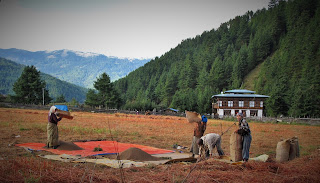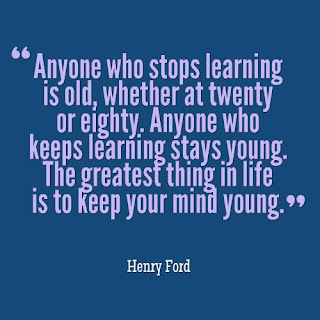 |
| Inaugural of New Bridge and Road for Darilog. |
It all began with simple resolutions of striving to live how I lived thus far without changing, to stay contended
with what life has given me, and to embrace each day with happiness. And
beautifully as the 2016 set its voyage, I saw myself taking the cruise happily.
The fair weathers days brought me more closely to relatives with more social
gatherings; visiting the temples for virtuous offerings, taking part into meritorious
promotion ceremonies, being part of important inaugural ceremonies at the
village, I saw the beautiful spontaneous development of life. 2016 is
remarkable for my remotely isolated village as our people, once disconnected were finally connected
with permanent bridge and farm roads, bringing more joy to my fellow villagers.
 |
| All set to Trek from Phobjikha to Adha. |
Technically, 2016 was also very active and busy year for me, though I had to take the leave from JSWNP family halfway. By far, I have traveled to all the villages under JSWNP except for Reti. Probably, I also had some of the longest treks within the park, walking all the way from Phobjikha to Adha, Adha to Rukha and finally exiting from Taksha in a small and efficient entourage, monitoring the progress of WWF funded project activities, for which I am the focal. Such beautiful journey though tiring, are also the most satisfying journeys as I could connect my soul with nature, people and livelihoods, the combination of which is vital for successful conservation efforts.
 |
| GIS Training in JSWNP |
Focally, I had the privilege of organizing important and strategic training workshops for my fellow foresters at JSWNP. For the first time, JSWNP could have a week-long GIS training to equip our friends in map making, followed by SMART-ly training our conservationists for patrolling and then rapidly assessing the Human-Wildlife Conflict issues in the park. As such, the three major trainings not only made us independent GIS analysts, but also strategic conservation scientist and innovative social negotiators, which are vital instruments in protected area management.
Internationally, I was lucky to be
part of His Excellency the Minister for Agriculture and Forests, Lyonpo Yeshey
Dorji’s entourage to attend the 3rd Asia Ministerial Conference on
tiger conservation in New Delhi in April. Other members were Hon’ble DG of the
Department, Mr. Chencho Norbu, Director of UWICE, Dr. Nawang Norbu, Mrs. Singye
Wangmo Sr. FO, RMNP, Mr. Tandin FO, WCD. So I becoming part of such a great
team was a real blessing. Since I joined DoFPS, I have been actively engaged in
many field works of camera trapping tigers and also had been a part of National
Tiger Survey 2015. The opportunity was right for me as I could learn more about
the status of tiger conservation in all the 12 other tiger range countries.
Sadly tiger was declared extinct in Cambodia, while global tiger number saw a
rise. While in DoFPS, I was always a core minute keeper, be it Forest
Conference or National Park Conference so I also had the privilege to learn how
firmly we should frame resolutions from such big conference.
Professionally, I saw the lights for
my further study when I received the confirmation for my pre-selection for
M.Sc. Landscape Ecology and Nature Conservation (LENC) at the University of
Greifswald on 27th January. I applied for M.Sc. LENC under German
Academic Exchange Service (DAAD) funding in December 2015. I was anxiously
waiting for the final selection results, but all at a surprise I received a
telephone call from the course coordinator without prior notice, to which I had
to give an interview which lasted over 25 minutes. Luckily that day I was working
in my office and not in the field. Dr. Tiemo asked me everything and my he
seemed to be contended with my response as he gave me a hint that I would be
selected. “I look forward to see you soon in Greifswald.” He said before
dropping the call. And few days later, I received the final confirmation for enrolment
to the university on 8th March. For DAAD scholarship, you will have
to first apply to the University, which will finalise the required candidates.
Once selected for enrolment, there are fewer things to do with DAAD, the
scholarship provider. By last week of July, I had to bid farewell to my office,
and then to my friends and relatives, with new dreams and aspirations. I had landed
in Greifswald in 29th of July. For an orphan who lost the Daddy
without sight, DAAD is now taking care of my 26 months long stay in Germany.
 |
| Greifswald Days. |
Studying in Europe has its own charm
and this would cover many more posts in my blog, which I will share
occasionally. However, the 2016 highlights from Europe is that I became student
after four years and also a free bird. Without compromising the classes, I
could visit the capital cities of Belgium, Denmark, France, Netherlands, of
course Germany, and the city of Malmo in Sweden. Life really has turned out to
be journey through woods and many more and each travel gives better exposure
and experiences, which I would share in subsequent posts.
 |
| Paris and the Eiffel. |
And beautifully the wonderful 2016 is
coming to an end today. The journey as I embraced from day one has been
beautiful and the voyage ended without much turbulence of waves, all owing to
many wonderful people that surrounded me. Therefore, I thank you all. I thank
my parents and relatives for your love, trust and confidence in me which
bolster my disposition to be a better human being; my chief, mentors, teachers
and field colleagues for your guidance, encouragement, and supports,
which strengthened my aspiration to be a better forester; my friends in and
beyond social media for being a wonderful companionship and helping me overcome
obstacles, celebrate success, finding solace when emotionally struck, for life
is never a bed of roses. Having landed in a faraway place, I feel blessed being
Bhutanese, I thank my motherland for my identity and our great Druk Gyalpos for
having secured our identity.
And as we begin a new year tomorrow, I wish everybody a happy and wonderful 2017. May we happily achieve your New Year resolutions, may we embrace more success and excellence, may 2017 be filled with love and laughter, health and happiness, peace and prosperity. May the misfortunes and grief lost its track before reaching us.
Wishing everyone Happy New Year.





















